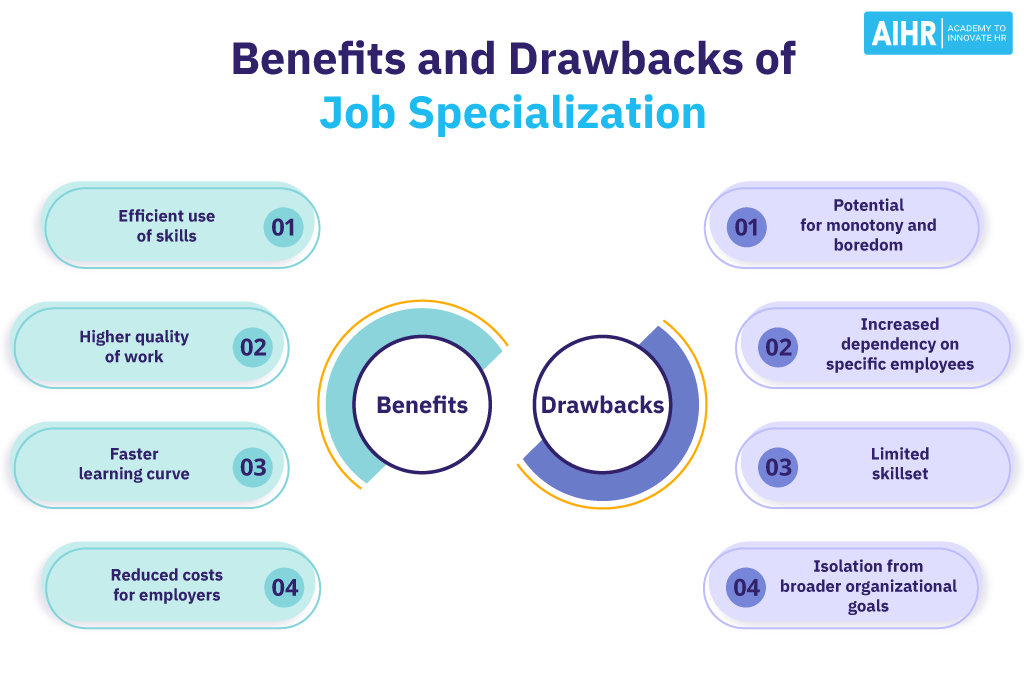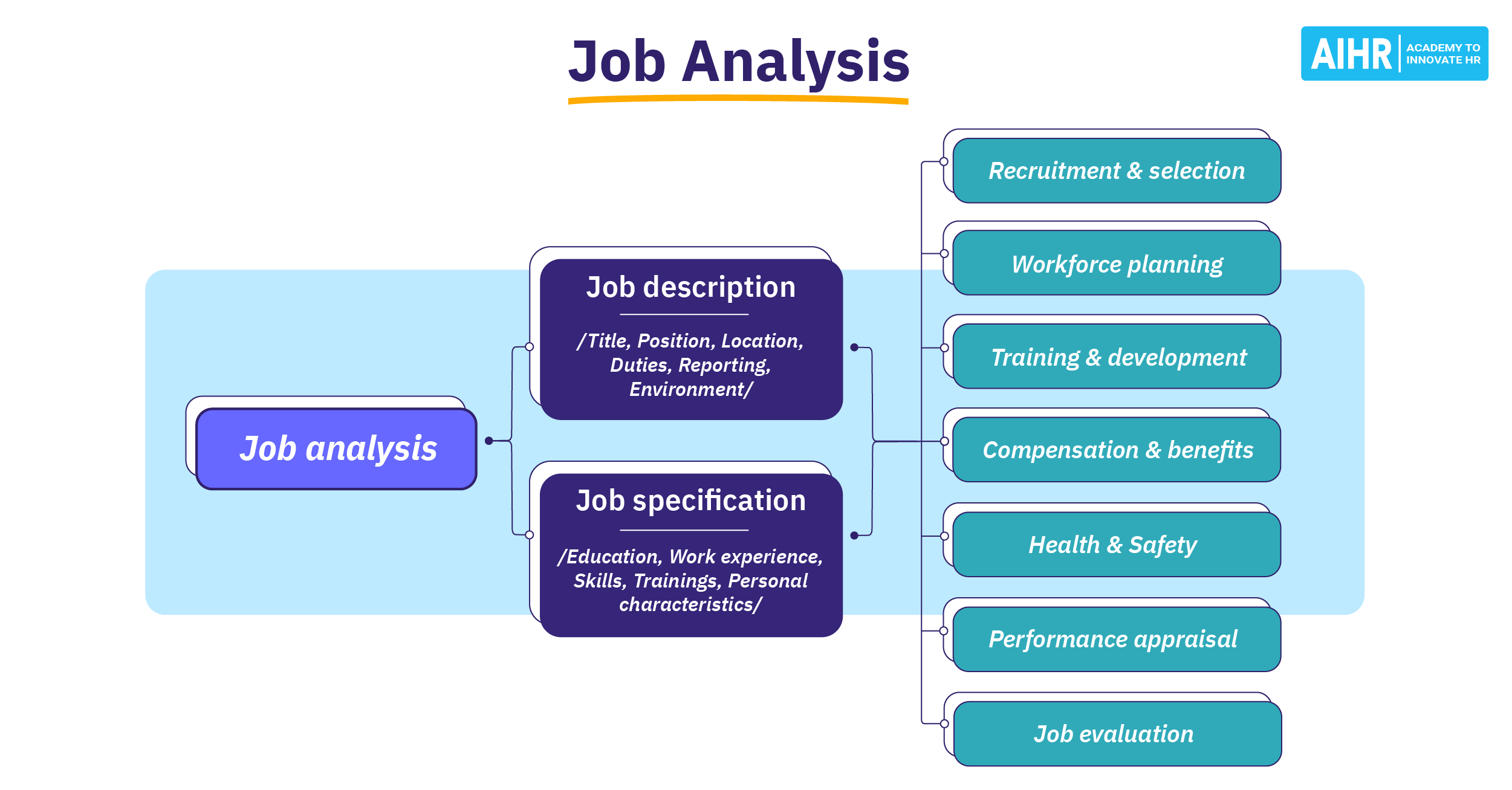Job Specialization
What is job specialization?
Job specialization is the process where individuals or employees develop specific skills and expertise to perform certain activities within their role. This approach to work divides broader job roles into more detailed, specific tasks, allowing employees to concentrate on these tasks to become experts in their particular area of responsibility.
The concept of job specialization is closely tied to the division of labor, a strategy aimed at improving efficiency and productivity by allocating distinct tasks to workers based on their skills and expertise.
Job specialization is often contrasted with work specialization. While both involve focusing on specific tasks to increase efficiency, job specialization focuses on the individual’s development of expertise in a particular role or activity within their broader occupational field. On the other hand, work specialization usually refers to the division of tasks within an organization to promote efficiency.
A brief history of job specialization
The roots of job specialization can be traced back to ancient civilizations, where the complexity of societies required the division of labor among individuals.
In Ancient Egypt, job specialization was a cornerstone of societal development, allowing for the construction of monumental architecture, such as the pyramids, and the advancement of agricultural techniques. Artisans, scribes, and builders developed specific skill sets, contributing to Egyptian society’s efficiency and technological advancement.
Similarly, job specialization was evident in Mesopotamia, one of the world’s earliest civilizations. The Mesopotamians are credited with numerous innovations, including the creation of a writing system and the development of advanced irrigation methods, both of which were made possible through specialized roles. This specialization not only facilitated the growth of cities but also the establishment of trade networks and the development of laws and governance.
Benefits and drawbacks of job specialization
Here’s a breakdown of the advantages and disadvantages of job specialization:
Benefits
- Efficient use of skills: Specializing allows individuals to sharpen their skills in a specific area, leading to increased speed and efficiency in task completion. Over time, specialists can develop techniques and shortcuts that improve productivity.
- Higher quality of work: With a focus on a single area, specialists often produce higher quality work. Their deep understanding of their specific task allows them to identify and correct issues more effectively and innovate within their realm of expertise.
- Faster learning curve: Specialized roles can be easier to learn and master since they focus on a narrower set of tasks. This can lead to faster onboarding and training processes.
- Reduced costs for employers: Specialized employees can often produce more work in less time, reducing labor costs for employers.
Drawbacks
- Potential for boredom: Performing the same tasks day after day can lead to boredom and dissatisfaction among specialized workers, impacting their motivation.
- Dependence on specific employees: Over time, specialized employees may experience difficulties when attempting to change career paths or pursue new opportunities within their organization.
- Limited skillset: While mastering a specific task or function, employees might miss out on developing a broader range of skills. This limitation can negatively impact their flexibility in taking on different roles or tasks within the organization. What’s more, it may restrict career advancement opportunities.
- Isolation from broader organizational goals: Workers may have a limited understanding of the business as a whole, which can hinder their ability to make contributions beyond their narrow field of expertise.

Job specialization examples
This section will provide illustrative examples of job specialization in different industries.
Healthcare industry
Diagnostic Radiologists exemplify job specialization in the medical field by focusing on interpreting medical images, such as X-rays, MRIs, and CT scans, to diagnose diseases. Their specialized knowledge is critical in guiding the treatment plans for various conditions.
These experts undergo extensive training to develop their expertise in reading and understanding complex imaging results, making them indispensable in the healthcare system for accurate diagnosis and patient care management.
IT industry
Cybersecurity Analysts specialize in protecting an organization’s computer systems and networks from cyber threats. They monitor, analyze, and respond to security breaches, implement protective measures, and advise on best practices for digital safety.
This specialization requires a deep understanding of information technology, network security protocols, and threat mitigation strategies.
How to transition employees to job specialization: Best practices
Transitioning employees to job specialization requires careful planning and execution to ensure the move benefits both the organization and its employees. Here are several tips for HR professionals to facilitate a smooth transition:
- Assess individual strengths and interests: Begin by evaluating each employee’s skills, strengths, and areas of interest. Use performance reviews, skill assessments, and one-on-one conversations to gather insights.
- Provide clear information and training: Clearly communicate the benefits and expectations of job specialization to employees. Offer comprehensive training programs to equip them with the necessary skills and knowledge for their specialized roles.
- Redesign job roles: Update job descriptions to reflect the specialized roles and responsibilities and design clear career paths for these roles, helping employees see the progression opportunities available to them.
- Offer mentorship and support: Pair employees with mentors with experience in their specialization area. Mentors can provide guidance, support, and feedback, helping mentees navigate challenges and grow in their new roles.
HR tip
Incorporating job specialization within your workforce strategy requires a balanced approach. HR professionals should ensure that while employees are encouraged to develop deep expertise in specific areas, cross-training, and skill diversification opportunities are also provided. Implementing mentorship programs where specialists can share knowledge and skills with others can foster a more resilient and flexible organizational culture.







